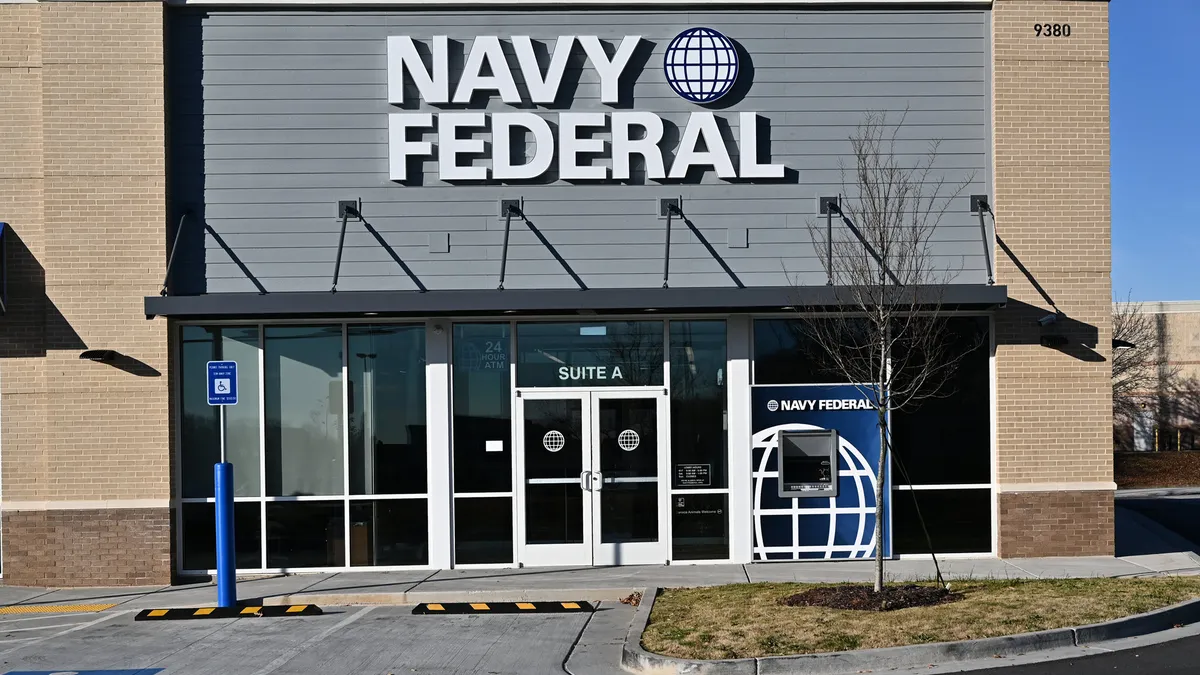The Independent Community Bankers of America called Navy Federal Credit Union out this week for co-branding the military’s overseas banking program Community Bank, and is calling on regulators to put a stop to it.
The trade group wants the Federal Deposit Insurance Corp. and the National Credit Union Administration to issue cease-and-desist orders to the $168 billion-asset institution, and said that “any attempts to conflate a bank with a credit union” could lead to confusion.
Community Bank is a co-brand with the Department of Defense Overseas Military Banking Program, in which a contracted financial institution operates DoD-authorized banks. Through the OMBP, Navy Federal will operate 60 military banking facilities and 272 ATMs already in existence at DoD installations in Europe and the Pacific. MBFs allow service members to access local currency, conduct bill pay, savings, checking and other financial services.
“The Overseas Military Banking Program fits our core values at Navy Federal and is consistent with our primary mission of supporting Active Duty military members and their families,” said Kara Cardona, Navy Federal’s operations chief. “Serving these families through this important DoD program is directly aligned with our mission.”
Navy Federal took over the OMBP from Bank of America, which operated the program for more than four decades.
ICBA CEO Rebeca Romero Rainey said in a press release, however, that cease-and-desist orders from regulators are “in line with NCUA legal guidance that has determined that federal law does not explicitly permit insured credit unions to refer to themselves as banks or banking organizations.”
“Names matter. Brands matter, especially for consumers and servicemembers that are customers. Navy Federal Credit Union’s attempt to label itself as a community bank creates market confusion and may lead servicemembers that are customers of this new bank to assume that their deposits are still federally insured. They’re not,” Michael Emancipator, ICBA senior vice president and senior regulatory counsel, said in an email.
“If the federal agencies don’t act now, what’s to stop others from masquerading as community banks, which are federally insured and highly regulated and revered as relationship lenders? This is a horrible precedent that should not go unchecked,” he said.
Rainey and Emancipator took aim at Navy Federal, which found itself in hot water recently following reports of racial bias in mortgage approval rates.
Navy Federal referred Banking Dive to its press release. The FDIC and the NCUA declined to comment, and the NCUA directed Banking Dive to reach out to the DoD and the Defense Finance and Accounting Service, which is responsible for the oversight of the Community Bank program. Neither responded to inquiries by press time.
Navy Federal accounts are insured by the NCUA up to $250,000. However, the NCUA does not insure funds within Community Bank, and told credit union consultant CU Collaborate in October that “insuring those accounts through the National Credit Union Share Insurance Fund would not be permissible under the Federal Credit Union Act.”
The accounts are instead insured by Excess Share Insurance, a subsidiary of American Share Insurance, which claims to insure more than $6 billion at 300 financial institutions. No depositor has lost money on an ESI-insured account since its inception 31 years ago, the firm said.
"ESI's experience and proven track record of providing private deposit insurance will empower the Overseas Military Banking Program to succeed in its mission while protecting the deposits of the military service members it serves," Theresa Mason, CEO of ASI and ESI, said in a prepared statement.














